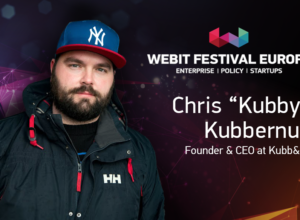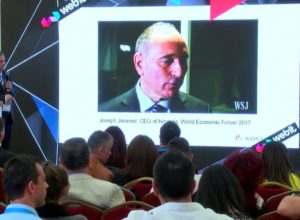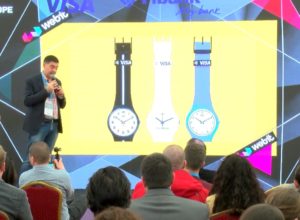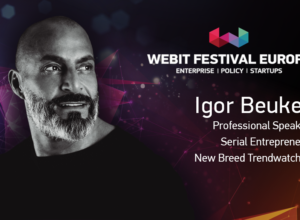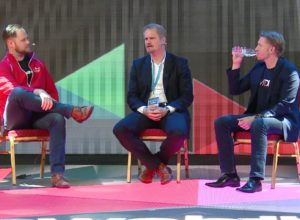Jelena Djokovic joins Webit.Festival in June 2018
Jelena Djokovic is the National Director of the Novak Djokovic Foundation - school building and learning organization whose mission is to change the world and status quo by investing in children, educators, parents, and youth through education.
Here you can see a full list of the confirmed speakers at Webit.Festival, while here you can get all the information you need about the tickets for the event.
This will be Jelena's fist time at Webit. She shared with us her expectations on the festival:
Webit stands behind the ''No woman, no panel!'' initiative and relates to women leading a successful organization. "No Woman, No Panel" is a campaign with a goal to raise awareness on having gender balance in panels and public events. Among the confirmed ladies for June 2018 are the Nobel Peace prize winner Tawakkol Karman, the General secretary of ITUC Sharan Burrow and now Jelena Djokovich The topic of Empowerment women in business and politics is one of the priorities of the Plenary Session, chaired by EU Commissioner Mariya Gabriel."I am looking forward to meet and learn from wonderful people who will be at the conference. So much to learn! I always come as a student and I am very excited to learn from all the wonderful people I’ll meet. "
We are seeing the women movement, including the Golden Globes awards, a few weeks back, inspirational words, particularly by Oprah Winfrey. In her inspiring acceptance speech for the Cecil B. Demille Award at the 2018 Golden Globes, she condemned a "culture broken by brutally powerful men" and predicted the dawning of a new era spurred on by the #MeToo movement.I feel genuine gratitude for many strong women out there who fought for our rights fearlessly. The inequality that I am experiencing or have experienced is nothing compared to what my mother had to deal with, or her mother.
I am quite lucky because I was raised by my parents to be strong, confident and bold at times to stand up and believe in myself despite obstacles. To stay true to myself despite the pressure of people’s perceptions of who I’m supposed to be, what I’m supposed to do, say, think.
We can see people who are still trapped in dogmas and outdated beliefs everywhere. That’s why I am so focused on children and young people in all the work I do.
Jelena is also the founder of the Original Magazine - an ambitious start-up owned by the Foundation whose goal is to empower youth to live their own success story. The magazine was presented to the general audience with huge success and it is recognized as a startup where positivity, compassion, creativity and curiosity are nurtured. It is putting light on people who chose to be their best version and not compromise it for the accolades. The magazine shares their life stories, sacrifices, lessons.I’ve been following this women movement as you say for months now. It is quite a revolution out there. I have known a lot of women to be very harsh to each other and I am loving how these tough moments that they are sharing is making them closer to each other and supportive of each other. Very touching indeed and very sad that these dark moments have to appear for us to realize that we are not one vs the other. We are together, #metoo so to speak.
I love how lately we have been trying to change the meaning of word ambitious in context of women. Some surveys have shown that if a women is described as ambitious, it is a genuine turn off for men. I really believe that we should be proud to call ourselves ambitious and motivated to excel in different areas of life, not just at home. We are the natural co - creators. God has given us a gift of being able to give birth to a child.
We are the nature’s most natural multi-taskers which is known to be something that you have to master in order to achieve greatness. It is logical that we also give birth to wonderful ideas and solutions to improve the life of many, and luckily many women have dared to step out of the borders that were imposed on them because of gender. I respect every choice one makes as long as they are true to themselves.
If you ask me if I believe in change in society to happen tomorrow, I don’t think I would give you a satisfying or positive answer. I do believe in change, but that change has to be really slow, continuous, from the root of problem. We can make the biggest impact today, and that impact can be seen only after 20-30 years. That impact can happen if we invest in the children and raise them with right values and love. Nobody teaches us to be parents.
We take courses and attend schools to acquire all these different skills that we will show in our CV and hopefully apply to work. But the most important skill we are yet to master is being a good parent, a good role model - and for that there is no course or school.
Lots of values today are distorted or traded off for fame, money, success. Many are losing and compromising their identities for their jobs or some status and perks. They believe they don’t have a choice but actually they always do. There is always a very expensive trade off when we chose to join the rat race.
We basically chose to share something that is not common for a magazine, blogs or newspapers today we don’t want gossips. We want passion, love, gratitude, joy, curiosity, boldness… That’s what we do, we encourage our readers to be true to themselves. To be Originals and not a copy of the current situation in the society.
Jelena is a strong believer in the lifelong learning concept and the strength that lies in empowering children, youth, and adults to be proactive, agile and positive about themselves. This belief fuels her passion and motivates her to always strive to do more. Early childhood education and development are her way of life now and Jelena is embracing this not only through her role of a mother but also through her work as the Foundation director.If we want the lasting change to happen, it requires patience, perseverance. We are changing things from the root.
That means we need to help parents be better parents, we need to help teachers be better teachers and we need to give every child opportunity to excel and develop skills at the early age. Once we set up the good foundation, the sky is the limit!
Nobel Peace Prize Laureate Tawakkol Karman joins Webit to discuss how...
Here you can see a full list of the confirmed speakers at Webit.Festival, while here you can get all the information you need about the tickets for the event.
As today’s world keeps changing at an accelerating pace, one can only expect to see significant breakthroughs in the fields of digital and innovations that will hopefully change our live for the better.
Tawakkol Karman is a human rights activist, journalist and 2011 Nobel Peace Prize laureate. She was crowned the Mother of the Yemeni Revolution in recognition of her prominent role in advocating and leading the 2011 revolution. She was also named the Lady of the Arab Spring because of her attitudes against the authoritarian regimes and counter-revolutions in the Middle East. In 2005, Karman founded Women Journalists Without Chains (WJWC) to defend press freedom and to combat human rights violations. She holds many positions and titles, most notably as follows: 1. Member of FAO-Nobel Laureates Alliance for Food Security and Peace 2. Member of the UN post-2015 High-Level Panel 3. Member of Transparency International’s Advisory Council 4. Member of Executive Board of Nobel Women's Initiative 5. Member of the Advisory Board of the World Education Organization This will be her first time visiting Sofia and she shared her expectations of the city and Webit:"I am so thrilled to have a chance to visit Sofia that combines beauty and deep-rootedness. For the festival, I expect it will be successful. The world everyday witnesses new ideas and innovations, and the digital world does not seem to stop at a certain point. As today’s world keeps changing at an accelerating pace, one can only expect to see significant breakthroughs in the fields of digital and innovations that will hopefully change our live for the better and show how to make the most of technology. Despite all the drawbacks, technology has made our lives easier and allowed us to accomplish our projects as fast as possible and at the lowest possible cost."
Tawakkol Karman was one of the first voices calling for the departure of Saleh's dictatorial regime, and she had always been firmly convinced of the need to achieve this goal as clearly expressed in her different articles during the pre-2011 period such as the one published by Al-Thawri newspaper, the mouthpiece of the Yemeni Socialist Party, on September 27, 2007. Therein, she called for a popular peaceful uprising throughout Yemen to overthrow the then existing regime to be replaced by a full democratic system."In normal circumstances, it may be hard to find an activist who does not engage in or interact with politics. But in difficult circumstances of some countries, such as Yemen, which witnessed a popular youth revolution in 2011, followed by a political movement followed by a counter revolution and several internal and external wars, it is very difficult for an activist to remain away from politics.
Many activists have been involved in politics in the hope of bringing about a change in existing policies, but I do not know if they have succeeded in doing so. The problem lies in regimes, which deal with different issues in their own way.
On the personal level, I have not yet decided to engage directly in politics. All I do is criticize and oppose the wrong policies from my own perspective as a human rights activist and defender."
Bold and outspoken, Karman has been imprisoned on numerous occasions for her pro-democracy and pro-human rights protests. Among Yemen’s youth movement, she is known as “mother of the revolution”, “the iron woman”, and “the lady of the Arab spring”. She has organized and participated in countless activities and written articles, calling for abandonment of despotism, extremism, violence and terrorism, for dialogues between religions and sects and for co-existence between peoples, cultures and civilizations."Tawakkol Karman is a young Yemeni woman who is a very strong defender of human rights inside and outside her own country. She always tells the truth despotic regimes do not like to hear. I practiced journalism, and I realized early on the importance of press freedom to make journalism play its role in disseminating information to the public and monitoring the performance of the authority. I founded NGO “Women Journalists Without Chains” that dedicated to defending media outlets and journalists and demanding the repeal of anti-freedom laws, training and qualifying journalists and human rights activists to do their jobs properly. In everything I do, I always make sure that I am the voice of freedom and the voice of the people, and therefore I oppose any governmental or non-governmental policy that does not care about interests and dignity of people. I have a dream of ending injustice everywhere, I feel sympathy for all the oppressed on this planet."
Since as early as 2007, the longtime activist for human rights and freedom of expression had been able to organize hundreds of protests, sit-ins and solidarity events, as well as campaigned for women’s rights and ending harassment of journalists. All of this became a source of inspiration for citizens to reject injustice and show solidarity without fear of influential and the security services."Journalists in the Arab region go through the most difficult times, as repressive regimes carry out arrests among them and enact laws and legislation to restrict their freedoms and independence. I believe it is not possible for a free press to be there in dictatorial countries. In case we are to overcome the obstacles journalists face, we must first overthrow tyranny and its laws. I would like to point to the double suffering of Arab journalist as both authoritarian governments and terrorist groups do not accept the role of the press."
On the question what motivates her to keep going with her endeavor, Karman answered:"I am motivated by believing that I have to play a role, which is to combat tyranny and to establish tolerant societies that enjoy freedom and justice.
Our people do not deserve to live under this injustice. We have to believe in ourselves and in our ability to overcome this difficult stage."
Given her prominent role in leading and calling for Yemen’s revolution, she was dubbed the mother of the revolution but also the lady of the Arab Spring especially after she was rewarded the Nobel Prize in 2011. Karman has been seen as an Arab icon for her defense of the values highly admired by the Arab Spring and for her contribution to combating autocracy. On the other hand, she was met with the hostility by the regime that resorted to conducting a series of smear campaigns against her. Moreover, she has become a target of the counterrevolutions and the military coups that have taken place in the countries of the Arab spring."At every stage, I had different challenges, and I often overcame them. But some challenges last for a long time, and each of us should care about. The persistence of political tyranny, religious extremism and the West’s double standards towards Arab and Islamic issues are among the most difficult challenges, as they perpetuate injustice and violence and contribute to spreading hatred among peoples.
Personally, I face challenges every day, but I do my utmost to overcome them. I do not believe there is anything impossible."
Despite the fact that the society in Yemen is conservative, she was able to convey a message that a woman could be a leader and decision maker through her insistence on continuing and leading peaceful protest movements. After years of daily and weekly sit-ins and protests led by Karman, WJWC’s activists and other activists of civil issues and human rights, millions of women took to the street to demand human rights and anti-corruption and call for the regime’s fall."I want people to remember me as one of them, my case is their cause, I have never surrendered, nor have I compromised principles. I always demand freedom and dignity for all.
My cause is to fight for everyone’s freedom in this world, especially the Arab region, which is experiencing a great struggle between the revolution and the counter-revolution. We can maintain our cause by insisting on achieving our goals no matter what the odds, as well as by working to entice the world to our just causes. In this context, I hope that the threat posed by tyranny to international peace and security through war, terrorism, armed groups, corruption and organized crime is clear to the world."
Mayors, administrators and policy makers meet the best in smart cities...
Join the mayors and top city administrators from Sofia, Rome, Paris, Amsterdam, Barcelona and over 50 more cities (as of today) from Europe at the 10th edition of Webit.Cities Summit (one of the 12 parallel events of Webit.Festival Europe).
Some of the participants of Webit include:
- Mariya Gabriel, Commissioner for Digital Economy and Society, European Commission
- Carlos Moedas, Commissioner for Research, Science and Innovation, European Commission
- Yordanka Fandakova, Mayor of Sofia
- Virginia Elena Raggi, Mayor of Rome
- Francesca Bria, Chief Technology and Digital Innovation Officer, City of Barcelona
- Ger Baron, Chief Technology Officer, City of Amsterdam
- Carl Bildt, Chair, Global Commission on Internet Governance
- Bogomil Balkansky, Vice President, Google
- Yonov Frederick Agah, Deputy Director-General, World Trade Organization
- Mari Kiviniemi, Deputy Director-General, OECD
- Catherine Carlton, Mayor elect (2014 and 2015) Menlo Park City and current city council members, Silicon Valley
- Juraj Vaculik, CEO, Aeromobil
If you'd like to see them all in person, listen to their experience and talk to them, please, book your ticket here, still at an early bird price.
Put your brand in front of the EU mayors, top city administrators and the people responsible for implementing smart city solutions within their respected municipalities and meet your next client or business partner among 7000 + attendees, 1500 of which top European policy makers from 110 countries. Request the Webit.Cities sponsorship brochure or join over 200 exhibitors
[youtube https://www.youtube.com/watch?v=z8D7ZENtxCE]
Investments in FinTech
Though the moderator of the panel was still sitting on his plane, being late for leading the discussion, the Advisor at 8VC Jon Soberg, the founder and co-CEO of H-Farm Maurizio Rosi & the Investment Director at iTech Capital Alexey Telnov managed to deliver their experience and insights in the discussion about Investments in FinTech at Webit.Festival 2017.
Stay tuned with the latest innovations by booking a ticket to Webit.festival Europe 2018
Technology is changing everything, in all sectors, businesses and business models and has an impact on society in the daily lives of millions of people. Technology is effective once it’s combined with the next generation.
FinTech is data
Money is data too, they represent the value. As we’ve already entered a “data age”, there’s much more consciousness about the data. From online payments through digital wallets and asset management, this is a pretty vast area of settling a company and acquiring a market segment of. As for FinTech where the area has been controlled by the big banks and large organizations until recently, now we see more and more startups creating new products and truly having an impact. Even though it’s getting more crowded in the last few years, this market still provides probably the biggest opportunity that’s out there in terms of a market.One of the advantages of investing in FinTech is that one always knows where the money come from
By default, FinTech companies are dealing with money so that makes an investor’s job easier in order to track the flows. This area is fairly straightforward when it comes to a particular business model and the way the business works. The market for financial services is more than enough large so nobody has to ask questions about the size of the market or how companies in the sector will make money. The question is whether they can execute and succeed. The buzz in FInTech naturally raises the question of security: security solutions and their integration in FinTech products and services. Companies are putting more and more information on the cloud so security is a sensitive issue in all areas and needs to be paid proper attention to. Companies operating in this domain need to deal with regulations, licences and still find a way to keep their customers data secure.Webit.Festival Europe 2018 presents: Chris ‘Kubby’ Kubbernus
Here you can see a full list of the confirmed speakers at Webit.Festival, while here you can get all the information you need about the tickets for the event.
We need to go back to good, credible and authentic storytelling that brings value to the consumer
The notion of change is essential in the 21st century. We are developing way faster than we thought we would in 2008, for example. We now consider diseases treatable, in comparison with just 10 years back; companies have to adapt to change, but this would be impossible without certain people - people who envision the future, who encompass change and apply it. Chris Kubbernus, or Kubby, as his friends call him, named #1 Business Guru on Snapchat by Forbes, will be among the speakers at Webit.Innovate! Summit at the next Webit.Festival Europe 2018 on 26th - 27th June 2018. The one thing Chris wishes people to remember out of his talk would be that things change. According to him, companies today are not using technologies to their fullest potential - not seeing what’s happening in the marketplace and cannot react adequately.“ If you say to an organization: 'I think you should use Snapchat, or get on Instagram', they’d roll their eyes and say: 'Why would we do that?’ What they don’t realize is that these things quickly become mainstream, and that’s where they’re losing. They’re actually ignoring what’s going on in the marketplace, thinking that it’s just a trend and therefore not doing anything about it. Change happens and organizations have to recognize that and act on it before it gets too expensive.”
Chris is originally from Canada, but he likes to say that he was “imported in Denmark” by his wife. The difference in the two continents is obvious, in terms of marketing, but what exactly Chris finds drastically different is:Americans and Canadians are more trusting in their advertising. If you make a claim, they might take that as face value, whereas I think with Europeans, you have to have a more soft approach.
Living in Northern Europe, Scandinavians, he continues have a different approach to advertisement. People there are more likely to doubt the quality of the product whereas the Americans would trust the ad and will expect the same results.In social media, I find that Europeans are more conservative. They are less likely to share and like something or to engage with content. I think it takes a lot to move them to action, where in North America, in particular, it seems to be easier. People are more relaxed towards sharing on social media and voicing their opinions.
Chris was a speaker at the first Snapchat conference - we saw the rise of Snapchat, we all know those Snapchat glasses, don’t we. We are now also seeing the fall of Snapchat as a platform, it doesn't attract so much audience, in fact, its users are youngsters. It just somehow feels Snapchat will not last much longer, although, Chris says, you have to wonder why the biggest social networks in the world are mimicking what Snapchat did.“ I think, in a way, Snapchat is being replaced by Instagram. Instagram is doing a very good job of copying and making their own new features. But Snapchat is a playground, still much more than Instagram. And Facebook sees that they are losing the younger generation, so I think that if Snapchat can continue being the anti-Facebook, they will stay relevant. They just need to retain that identity. “
Besides Facebook, another huge platform is so very widely used - Instagram. The main differences in the two platforms, Chris explains like this:On Facebook, content is consumed slower and with more thought. People are less likely to like on Facebook, whereas on Instagram, there’s less exposure and more anonymity. Instagram is a little hedonistic in some ways, while Facebook is your core of friends and family, where you have to be more ‘considerate'.
Unlike some other social platforms, like Snapchat, for example, Facebook will be present in our lives for many more years. It is a place where you can document your entire life and in terms of ‘replacing’, Instagram will not replace Facebook as a social media platform. At the end of the day, “both platforms are playgrounds for displaying different parts of our personalities”. My social media predictions for 2018 is a continuation and examination of influencer-marketing and how much we let social media influence us, says Kubby. The psychological effect of social media will continue to determine the way we communicate and perceive information and the trend of what is real and what is fake will determine the consumer’s behaviour.“ Right now, digital marketing is losing consumers because of disinterest and mistrust in fake influencer-marketing. We need to go back to good, credible and authentic storytelling that brings value to the consumer. “
Perspective from the pharma industry to value-based care
Stamen Popov, the Novartis Oncology Business Unit Head for Bulgaria & Macedonia was a keynote speaker at Webit.Festival 2017. His keynote covered the topics about the “from cost to value ” conversion in healthcare and treatment.
Healthcare spending is increasing faster than than the current economic climate’s capabilities
Many countries are concerned that higher spending doesn’t lead to proportionally better outcomes. Healthcare systems waste a significant amount of resources that limits the fiscal space and hinders performance. The largest percent of wasted resources goes to over-hospitalization, over-examinations and over-prescription of pills. Waste is also created by inefficient or flawed rules, overly bureaucratic procedures and poor execution or lack of best practices, e.g. effective preventive care or patient safety, low volume for specific treatments per hospital, etc. Mr Popov made a point that the most expensive pill appears to be the one which hasn’t delivered any positive effects to the patient. The pricing in the industry has to start evolving with accordance to the fast paced changes in technology and the development of new ways of treatment. Companies should to be paid for a result delivered, not for a specific pill. A shift needs to be made in pricing, away from what has been a transactional approach to a value-based approach. That should mean focusing on the outcomes and really communicating the value of the medicines and pricing them accordingly. Care routed in outdated habits, ignoring scientific findings and motivated by something other than optimal care shouldn’t be the care of today.Focusing on value-based care, reducing waste and directing investments to the point where greater value can be produced is critical for sustainability.
Universal health care aspirations will be hard to materialize if we don’t shift to value-based care and change policies to support this shift. This change requires collaboration with every member of the healthcare ecosystem and better public-private partnership. Healthcare systems should stimulate more effective treatment results with the help of all parties involved in the process - patients, medics, researchers, healthcare providers and pharma companies. If you want to stay up-to-date check the Webit.Festival website for upcoming speakers and our ticket options.The transforming world of payments
Visa is not the first credit card!
Maybe it’s no news for you, but for the majority of the audience of the Red Stage at Webit Festival, it certainly was. The one who made that revelation is the General Manager of Visa for Israel, Mr. Oded Salomy. He had a keynote at last year’s edition on enabling the transforming world of payments. Visa is one of the names that probably need no introduction. “Visa” has become a nickname for our payment cards. So much, that people tend to there’s much more behind it than just a plastic for payments. Payments is such a vast area that it’s quite unpredictable what the future will bring. We never know what’s going to impact payments and the booming fintech industry. Everyday payments, business to business payments, business to customer payments and reverse.. Machines paying other machines rather than humans, biometrics being used in order to identify people by their biological characteristics.. All the way up to crypto currencies and tokens. New services, easier to work with and keeping a proper security level are needed by this ever evolving system. Numerous startups have been trying to be the next “big thing” that will shake the world of payments as the price of Bitcoin did some time ago.In the Internet of Things space things have been connecting to Fintech too
Wearables such as rings, bracelets, wrist-watches and keychains are becoming more than just accessories - there are already ones out in sale that can allow us to pay on the move. Another category that’s being impacted is the connected cars. With just an Internet connection we can pay for grocery, for gas, parking, insurance while going to work or some more without the need to get out of the vehicle. And last but not least, check the Webit.Festival website for upcoming speakers and our ticket options.Webit.Festival Europe 2018 presents: Igor Beuker
Advertising may win quarters, innovation wins decades
He is a new breed trendwatcher, energetic professional communicator, serial entrepreneur, award-winning marketing strategist and this will be his 4th Webit event - three times in Sofia and once in Istanbul, Igor Beuker has lots to share about his Webit experience.“ Amazing conference, very well-organized, fantastic setting and backstage program, great speaker line-up, and very important to me as a professional public speaker and human being: the connection with the audience (at the event and on social media) is rare and heartwarming. “
Igor is among those speakers who have a special connection with their audience. Here is what he says about the audience in Sofia, and to his fans, in particular:“ The connection with the audience in Sofia, is really one of a kind. I can’t explain the feeling.It’s one of the reasons why - out of 150 international talks each year - Webit is one of the highlights I really look forward to ”
We cannot deny that the difference between Sofia and Istanbul is enormous. Here is what Igor says about his experience:
“ Istanbul is a huge international city and the conference is a bit more business focused and formal than in Sofia, was my experience. I love the culture and the passion of the people in Turkey, and some of the attendees became business partners and friends.”
Bulgaria and Sofia are aiming at becoming a digital hub for CEE and the attitude and approach towards this is a bit more casual. In the same time, however, we coordinate with the government and local authorities, and as from last year, we were incredibly proud to announce that Webit is the flagship event of the Presidency of the Council of the European Union. The EU Commissioner for Digital Economy and Society Mariya Gabriel is chairing Webit's Plenary Sessions and is a patron of Webit.Festival along with The Government of Bulgaria and the Mayor of Sofia.” Last year I shared the stage and the dining table with the president of Bulgaria and the Mayor of Sofia, which is a great opportunity to share ideas.”“Burning Man meet TED” and “Math Man in a world of Mad Men”...
...are just a couple of the new terms that were invented by the Bulgarian audience. At this year’s Webit.Festival Europe edition in Sofia, Igor will further develop his Mad Men vs. Math Men theory."Can I stretch my Mad Men vs. Math Men theory and framework even further? The Webit audience will give me the answer with their reviews and social feedback. My team and me value what they say and I even reinvent my speeches and one-liners for my talks, based upon what they highlight. That legacy brands and incumbents need to get out of their comfort zones, because that’s where the magic really happens. My bold style and personality I can’t change at 47, but the audience feels I know my why and I keep walking towards my purpose. Next-level change and reinvention is needed. Big is only good when big is smart: Advertising may win quarters, innovation wins decades.”
Igor is loved by the companies, adored by his fans and audience everywhere he goes and also by the media.
He gave a very special, exclusive, interview for a Bulgarian media. You can watch his interviews here, where he elaborates his Mad Men vs. Math Men theory in a more simple way. Igor’s answer to “how would you describe the atmosphere at Webit, he says: “Hard to describe, but when I look at the audience tweetback on my site, I get a huge smile on my face and I can’t wait to be back!”We can’t wait to welcome you again, Igor! You have a very special place in our city and our hearts.
“ Experiencing the last three years, I expect Webit 2018 to be even bigger and better than the previous editions. If that is even possible.”
Sure it is! You don’t believe us? Take a look at the amazing speakers line here and the one of the kind networking opportunities here. You wish to attend? Book your ticket here.Dancing with an Elephant: Corporates & Startups
Apply for our Founders Games and get the chance of being among the 200 startups presenting their innovative idea in front of investors, business leaders and all attendees of Webit.Festival 2018.
Corporates & startups. Two forces of the business world which are as much different as they need each other. Brian Collins (AngelHack), Jonas Jacobi (IBM) & Matthias Schanze (Siemens) put some light on this complex relationship Mr. Schanze described as”Dancing with an elephant”




